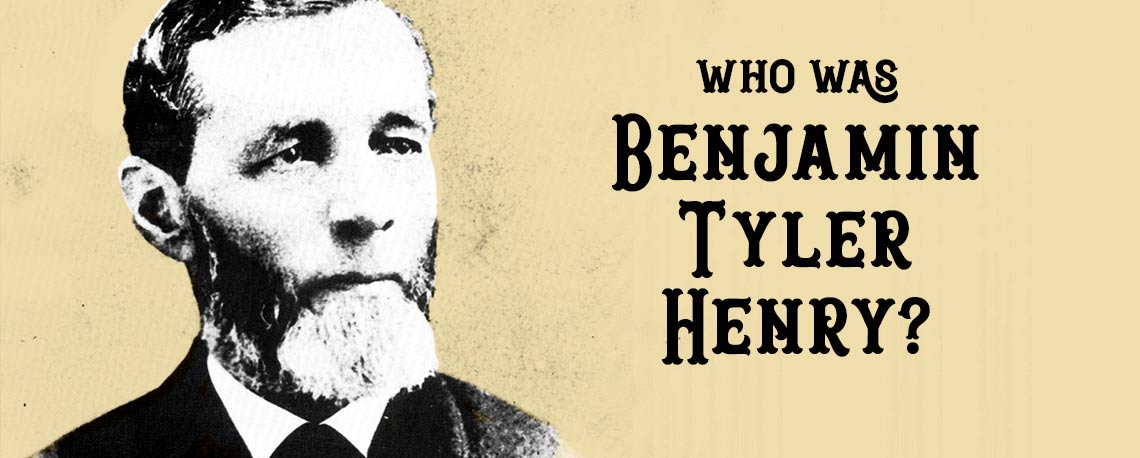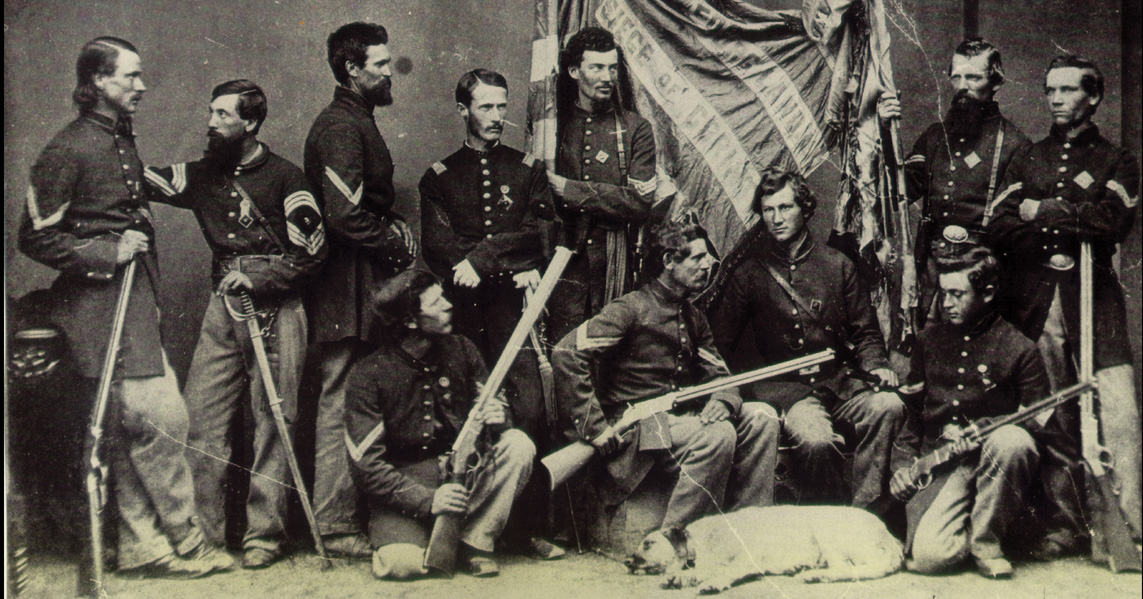Who Was Benjamin Tyler Henry?

The Henry name, synonymous at once with the advent of the first reliable lever action rifle as we know it, as well as the “load on Sunday, shoot all week long,” mantra, is known the world over for innovation, quality, and intrigue. Some 158 years since Benjamin Tyler Henry received the patent on his original .44 caliber repeating rifle, we are here with Henry Repeating Arms, a rebirth of the beloved old Henry name. Though we are familiar with today’s Henry name, quality, and customer service, what do we know about—and owe—to the man, BTH?
THE FAMILY
Born March 22, 1821 in Claremont, New Hampshire into one of the area’s most influential families, the young Benjamin Tyler Henry was destined for grandeur. His grandfather, Colonel Benjamin Tyler, came to Claremont from Connecticut in 1767—the current home of modern day Henry Repeating Arms– to become the town’s first millwright, builder of multiple successful mills, and inventor of the wry-fly water wheel. That water power ingenuity led the town to prosperity. Another of the Colonel’s grandsons, James Tyler, further perfected his grandfather’s water wheel design, allowing tremendous textile and paper industry growth harnessing the power of the water, and ushering the town to prosperity through the Industrial Revolution. This industrious spirit was alive and well in young Benjamin Tyler, no stranger to the American way—hard work, dedication, and ingenuity leading to success. While he could have followed in the family footsteps, Benjamin Tyler Henry chose to pursue his passions for design and firearms, unknowingly creating an even larger and more lasting name for himself.
BTH
From young apprentice gunsmith and aspiring designer to one of the most underappreciated albeit influential firearms designers in American history, Benjamin Tyler Henry made the Henry name synonymous with the everyman American aspiring for greatness, freedom, and success. This was a man not afraid to break from his family’s lucrative lineage in big industry to forge his own way from the bottom up.
Thus it was he started from scratch, apprenticing for a gunsmith as soon as he was old enough and within a short time, working his way into the role of shop foreman for the Robins & Lawrence Arms Company of Windsor, Vermont. There, he was united with growing names in the firearms industry, the eastern-United States powerhouse area for firearms design and production—coming to work with Horace Smith and Daniel Wesson. Together, both Smith and Wesson labored to create a complicated lever-run external percussion cap rifle known as the Volitional Repeater, which was but a flash in the pan.
When Smith and Wesson moved on from the Volcanic design, a complicated series of moves led to the group re-organizing, and eventually taking on powerhouse investor Oliver Winchester. Henry kept his head down and himself smack dab in the center of things, toiling away with the blue collar dedication and drive that we’ve all come to appreciate from the Henry name. When a series of struggling and continually re-branding firearms companies eventually came to settle in New Haven Connecticut in late 1856 as the New Haven Arms Company, the 36-year-old B.T. Henry was brought on as plant superintendent, having earned the trust of both Smith and Wesson.

THE BREAKTHROUGH
The rest, as they say, is history. Though Henry helped get New Haven Arms off the ground with his leadership of the plant laborers, his heart was not on commanding a factory floor for others. Rather, having worked his way through the ranks of the firearms and gunsmithing industry, armed with a working knowledge of business, Henry was a designer at heart and continuously perfected his brainchild. Though he believed in his abilities and knew he had done something greater than had been accomplished before in that space, Henry could not have known how great a contribution he had made to the history of firearms design. In 1860, he received the patent on his Henry Repeating Rifle, .44 caliber.
Within a year, the Henry Repeater was put into production in connection with the New Haven Arms Company and under the thumb of investor Oliver Winchester. Shortly thereafter, the Henry Repeating Rifle found its way to the bloody battlefields of both the Civil War and later, the Indian Wars. Soldiers hastened to get their hands on this new advent, a repeating rifle that could fire sixteen shots without reloading at a time when other arms of issue were muzzleloading muskets that required reloading with each shot. While practiced soldiers could load and fire several rounds per minute with their muzzleloaders, the Henry Repeater was a modern marvel. Unfortunately, the Repeater was hindered by price when compared to muskets like the Springfield Model 1861, which could be bought for less than half the cost of a Henry.
Though the Henry Repeater never achieved in its time what we now in hindsight see as a pivotal American firearm design, some 15,000 Henry’s were produced. As a testament to their quality and ingenuity of design, many survive to this day, though collectability and beauty of the patinaed brass far outweigh interest in firing these fine specimens.

LATER YEARS
In the years that followed the rather brief Henry Repeater production boom, the Civil War was reaching its bloody conclusion and things has turned unpleasant for BTH inside the walls of the company that was producing his rifle. Believing he was not being appropriately compensated for his design—the thing into which he had invested years of his life and desires–Henry eventually reached an impasse with New Haven Arms as investor Oliver Winchester sidestepped Henry’s attempt to have Connecticut state legislature award him ownership of New Haven.
Winchester, while working behind the scenes himself to improve upon Henry’s repeater, was able to reorganize and rebrand the company as the Winchester Repeating Arms Company. Benjamin Tyler Henry left the Winchester Repeating Arms Company thereafter, not knowing at the time the difference his design would make not only on the Winchester 1866 lever action rifle, but more importantly, on the face of American firearms. The lever action rifle, with the blood, sweat, tears and drive of BTH, is now recognized as perhaps America’s greatest offering to the firearms of the world.
After Benjamin Tyler Henry left the Winchester Repeating Arms Company, he lived a long and pleasant life, remaining in the field he loved, working for the rest of his days as a gunsmith. At the age of 77, BTH passed away on June 8, 1898 just as he had begun—a blue collar American with a love for firearms, requiring neither fame nor fortune in exchange for a life well lived, and a legacy that thrives to this day.
CONCLUSION
Though BTH has no direct ties to the Henry Repeating Arms Company we know today under the guidance of Anthony Imperato, there’s little doubt that Mr. Henry would be proud to see his name alive and kicking, associated with the values that once drove him to success—hard work with a nod to the average American worker. Let us tip our hat to Benjamin Tyler Henry in recognition of his life, his legend, and remember–every time you cycle that lever on your rifle, you’re paying tribute to the man who created the first reliable repeater. What a beautiful part of history in which we all partake today.






